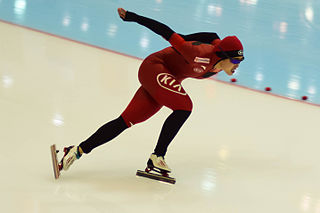
The 1994 Winter Olympics, officially known as the XVII Olympic Winter Games and commonly known as Lillehammer '94, was an international winter multi-sport event held from 12 to 27 February 1994 in and around Lillehammer, Norway. Having lost the bid for the 1992 Winter Olympics to Albertville in France, Lillehammer was awarded the 1994 Winter Games on 15 September 1988, two days before the 1988 Summer Olympics opening ceremonies at the 94th IOC Session in Seoul, South Korea. Due to the calendar changes made in 1985, this was the only time that the Winter Olympics took place two years after the previous Winter Games, and the first to be held in a different year from the Summer Olympics. This was the second Olympic Games of any type hosted in Norway — the first being the 1952 Winter Olympics in Oslo — and the fourth Olympics overall to be held in a Nordic country, after the 1912 Summer Olympics in Stockholm, Sweden, and the 1952 Summer Olympics in Helsinki, Finland. As of 2022, Lillehammer is the northernmost city ever to host the Olympic Games and also the smallest. This was the last of three consecutive Olympics held in Europe, with Albertville and Barcelona in Spain hosting the 1992 Winter and Summer Games, respectively.

The 1984 Winter Olympics, officially known as the XIV Olympic Winter Games and commonly known as Sarajevo '84, were a winter multi-sport event held between 8 and 19 February 1984 in Sarajevo, Yugoslavia. It was the first Winter Olympic Games held in a Slavic language-speaking country, as well as the only Winter Olympics held in a communist country before the 2022 Winter Olympics in Beijing, China. It was the second consecutive Olympic Games held in a communist country, after the 1980 Summer Olympics in Moscow, Russian SFSR, Soviet Union.

The 1952 Winter Olympics, officially known as the VI Olympic Winter Games and commonly known as Oslo 1952, was a winter multi-sport event held from 14 to 25 February 1952 in Oslo, the capital of Norway.

The 1960 Winter Olympics were a winter multi-sport event held from February 18 to 28, 1960, at the Squaw Valley Resort in Squaw Valley, California, United States. The resort was chosen to host the Games at the 1956 meeting of the International Olympic Committee (IOC). Squaw Valley was an undeveloped resort in 1955, so the infrastructure and all of the venues were built between 1956 and 1960 at a cost of US$80,000,000. The layout was designed to be intimate, allowing spectators and competitors to reach most of the venues on foot.
The 1992 Winter Olympics, officially known as the XVI Olympic Winter Games, were a winter multi-sport event held in Albertville, France, from February 8 to February 23. A total of 1,801 athletes representing 64 National Olympic Committees (NOCs) participated in 57 events from 12 different sports and disciplines. In a break from tradition, the medals were primarily made of crystal rather than metal: gold, silver, or bronze was used only on the border.
The 1984 Winter Olympics, officially known as the XIV Olympic Winter Games, was a winter multi-sport event held in Sarajevo, Yugoslavia, from 8 to 19 February 1984. A total of 1,272 athletes representing 49 National Olympic Committees (NOCs) participated in 39 events from 10 different sports and disciplines. First time NOCs to enter were Egypt, Monaco, Puerto Rico, Senegal, and British Virgin Islands.
The 1952 Winter Olympics, officially known as the VI Olympic Winter Games, took place in Oslo, Norway, from 14 to 25 February 1952. A total of 694 athletes representing 30 National Olympic Committees (NOCs) participated in the Games, taking part in 22 events from 6 sports.

Short track speed skating at the 2006 Winter Olympics was held over thirteen days, from 12 to 25 February. Eight events were contested at the Torino Palavela. In the men's competition, Ahn Hyun-soo earned a medal in each event, winning three golds. On the women's side, Jin Sun-yu scored three gold medals.

The men's 500 metres speed skating competition for the 2006 Winter Olympics was held in Turin, Italy. The competition consisted of two separate 500 metre races, with the competitors ranked by their cumulative time from the two races.

Lee Kang-seok is a South Korean speed skater. He is the 2007 and 2009 World Champion for 500 m. At the 2006 Winter Olympics, he won a bronze medal in the 500 m. He is the second South Korean person to win a medal in an event outside of short track speedskating, and he has become a representative to show that South Korea is expanding towards cultivating their athletes to excel in sports other than short track speed skating.
Jeon Da-hye is a South Korean short track speed skater who won gold in the women's 3000 metre relay at the 2006 Winter Olympics.

Finland first participated at the Olympic Games in 1908, and has sent athletes to compete in every Summer Olympic Games and every Winter Olympic Games since then. Finland was also the host nation for the 1952 Summer Olympics in Helsinki. Finnish athletes have won a total of 305 medals at the Summer Games, mostly in athletics and wrestling. Finland has also won 175 medals at the Winter Games, mostly in nordic skiing events.

Slovenia first participated as an independent nation at the Olympic Games at the 1992 Winter Olympics in Albertville, France, and the country has sent athletes to compete at every Games since then. The Slovenian Olympic Committee was established in 1991 and was recognised by the International Olympic Committee on 5 February 1992.

Uzbekistan sent a delegation to compete at the 2010 Winter Olympics in Vancouver, British Columbia, Canada, from 12–28 February 2010. This was the country's fifth appearance in a Winter Olympic Games. The delegation consisted of three athletes: Kseniya Grigoreva and Oleg Shamaev in alpine skiing, and Anastasia Gimazetdinova in figure skating. None of the Uzbekistani competitors won a medal at these Olympics.

Yu Jing is a Chinese long-track speed-skater who specializes in the sprint distances. She became the World Sprint Champion in 2012, setting world records in both the sprint combination and the 500 metres. She held the world record in the sprint combination until Heather Richardson bettered it in January 2013, and the world record in 500 metres until Lee Sang-hwa broke it in November 2013. The time, 36.94 seconds, was the Chinese record until broken by Wang Beixing in November 2013.
Yu Baiwei, also known by the Western name Berry Yu, is a Chinese ice hockey player and captain of the Chinese national team and of Shenzhen KRS in the Chinese Women's Ice Hockey League (WCHIL). A three-time medalist at the Asian Winter Games, she represented China in the women's ice hockey tournament at the 2010 Winter Olympics in Vancouver and in the women's ice hockey tournament at the 2022 Winter Olympics in Beijing.
Huang Yu-ting is a Taiwanese speed skater who has competed in inline speed skating, short track speed skating, and long track speed skating. She was the flagbearer for the 'Chinese Taipei' team at the Beijing 2022 Winter Olympic Games' opening ceremony.










